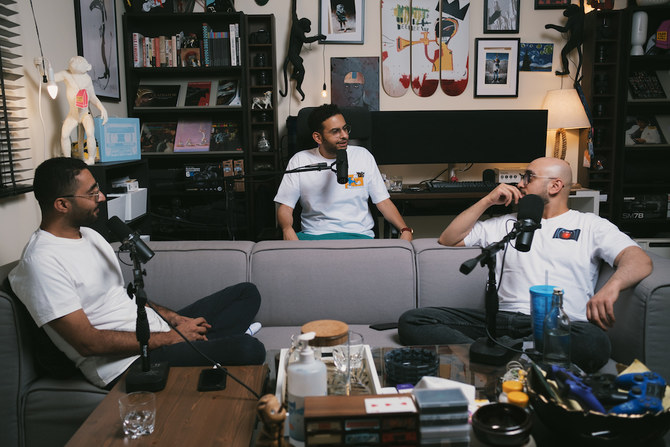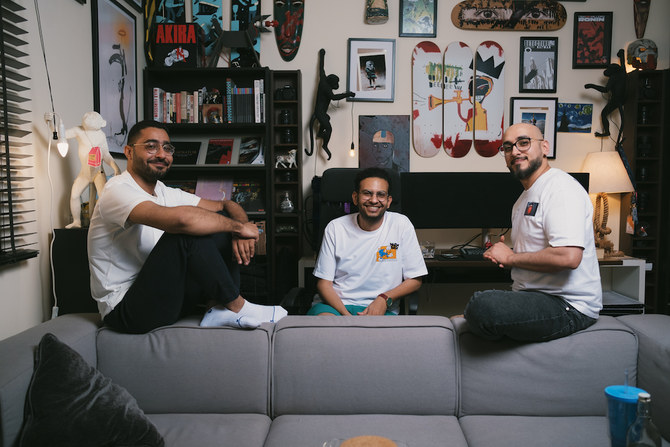RIYADH: In the heart of the Saudi capital, a trio of millennial men rhythmically unzip multiple black pouches, taking out lighting and camera equipment to set up their podcast—almost like a silent synchronized dance.
With one hand on the mic and one ear to the ground, the Pass the Kabsa (PTK) podcast has been cooking up commentary on the Saudi cultural scene for a couple of years.
The podcast has achieved cult status within Saudi urban subculture and become part of a greater cultural shift in the Kingdom, by bringing together Arab hip-hop, western tongues and Saudi sensibilities.
The podcast was started by Adel Al Ghamdi when he moved back to the Kingdom in 2020 as the pandemic put the world into lockdown. He gathered his old friends Terki Shalhoub (known as Terks) and Mohammed Al Shamsi (Shamsi), to join him on air.
Their goal was to export local culture to the west and focus on the two topics they loved the most — Saudi and hip-hop. Their biweekly podcast episodes are about an hour-long and are available on all streaming platforms and on YouTube.

(AN Photo/Nouf Yarub)
On Sundays, the Kabsa Boys, as they have become known, discuss the main news headlines of the day, as well as their thoughts on new albums dropping or on upcoming projects. On Thursdays, they dedicate the hour to responding to questions from the audience. If that schedule seems saturated, that might be the point. There is so much culture to unpack.
Not to be mistaken for a culinary podcast — Kabsa is a quintessentially Arab staple, a communal platter of rice and meat — the podcast serves up Saudi culture and curiosity in an audio-visual format. Friends and family would exchange stories and recite their dreams and aspirations while digging in. Post-pandemic, the PTK boys modernized the concept to fit the current time and kept in mind the bite-sized portions—or conversations.
“The Pass the Kabsa name came through us passing information, passing knowledge and passing conversations back in the day. We used to sit down on the ground and all eat together. But now you’re sitting at a table, and you’re passing the ‘kabsa’ and you’re passing the information,” Al Ghamdi told Arab News.
“Our audience is an English-speaking audience, whether it’s local or international — anyone who is interested in Saudi culture and what is happening in the country, whether it’s the creative community, fashion scene, the music scene—and especially hip-hop,” Shalhoub said.
The Kabsa boys are true fans of the hip-hop genre. While all three were born in Saudi, their lives took different routes — but music was their great unifier. While Shalhoub and Al Shamsi were raised in Riyadh, they went to university at KFUPM in AlKhobar and were influenced by the music of the west while remaining immersed in Saudi. Meanwhile, Al Ghamdi grew up in various cities in the west but remained deeply rooted in the east.

(AN Photo/Nouf Yarub)
“We are big fans of hip-hop in the local music scene. We like to shed light on everything that is happening here and show support to the locals who are working really hard to make a name for themselves,” Al Ghamdi said.
The podcast is just the beginning. They saw first hand how their episodes have been shifting the culture slowly, dismantling and building a healthy ecosystem from the underground up. They are also partnering with places such as the Diriyah Biennale Foundation and have recorded episodes of the podcast live at the venue.
While the live shows bring a different dynamic by engaging directly with the audience, the trio seem most comfortable at the PTK headquarters in Al Ghamdi’s home. They have a curated roster of local and international creatives joining as guests on the podcast, such as Saud Al Turki, who created the music for their intro, international icon Swizz Beatz and Dalia Al Akki of the Diriyah Biennale, among others.
“We are all friends—we’ve known each other for years and we just wanted to have real conversations with ourselves and with the community around us. Pass the Kabsa is our way of exporting our culture to the world and letting the world know what’s going on in Saudi and just opening up a window on everything that is happening on the local subculture here today,” Al Shamsi said.






























